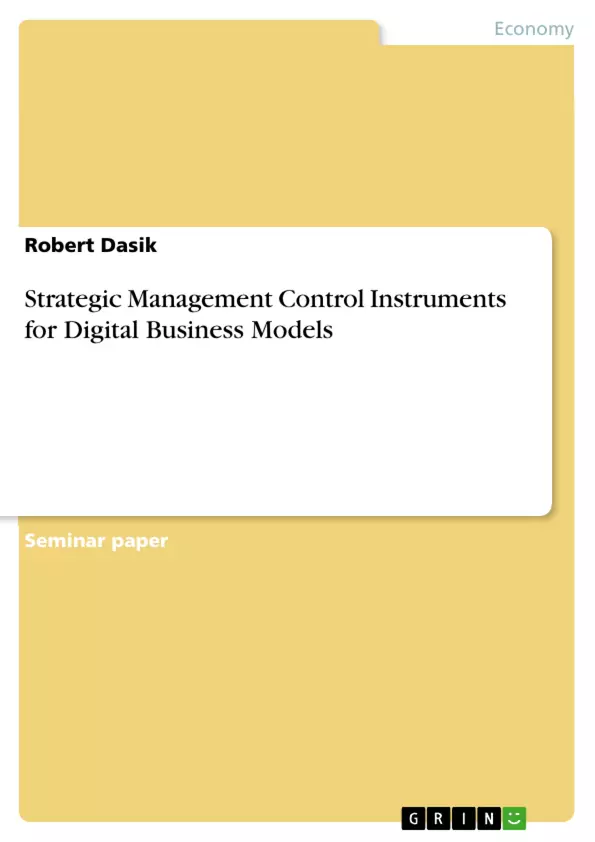The purpose of this study is to examine the key contrasts between strategic control in digital and traditional company models. Furthermore, we will examine the most appropriate strategic control instruments for digital business models, as well as the main challenges that such a business model brings. Finally, we will discuss the strategic control instruments' strengths and weaknesses as well as proposed adjustments that could improve those strategic management control instruments.
In the age of digital disruption, companies worldwide are negotiating an ever-evolving terrain, loaded with possibilities and problems. The fundamental transformations in customer behavior, technology, and worldwide connection have resulted in the era of digital business models, rendering old techniques of strategic management control ineffective. To succeed in this digital frontier, businesses need to harness a new set of instruments and strategies particularly adapted to the changing digital environment.
The core of strategic management control in the context of digital business models focuses on an organization's ability to guide its operations and resources toward accomplishing long-term objectives while being agile in the face of quickly changing conditions. The fourth industrial revolution has created a perfect landscape for digital business models and certain challenges such as rapidly changing technologies, shorter product life cycles for digital products, and data overload.
As a result, many digital business models fail because companies are unable to capitalize on the promised benefits of major investments in digital technologies.
Table of Contents
- Introduction
- Strategic Management Control in Digital Business Models and its Differences to Traditional Business Models
- Fundamental Differences
- Strategic Management Control and its Particularities
- Key Control Instruments
- Environmental Analysis
- Corporate Analysis
- Challenges Of Digital Business Models Using the Example of Airbnb and Meta (Facebook)
- Meta (Facebook)
- Airbnb
- Conclusion
Objectives and Key Themes
The objective of this study is to explore the fundamental differences between strategic management control in traditional and digital business models. It further aims to analyze the most effective strategic control instruments for digital business models and discuss the associated challenges. Finally, the study will examine the strengths and weaknesses of these instruments and propose adjustments to enhance their effectiveness.
- Strategic management control in digital business models
- Key differences between digital and traditional business models
- Strategic control instruments for digital businesses
- Challenges of managing digital business models
- Strengths and weaknesses of strategic control instruments
Chapter Summaries
The introduction discusses the impact of digital disruption on traditional business models and the emergence of digital business models. It highlights the need for new strategies and instruments to manage control effectively in the digital environment. The chapter explores the challenges posed by rapidly changing technologies, data overload, and the need for agility in the face of evolving market dynamics. It introduces the concept of strategic management control and its importance in guiding operations and resources towards long-term objectives.
The second chapter delves deeper into the differences between strategic management control in digital and traditional business models. It explores the fundamental differences in their structures and emphasizes the need for tailored strategies in the digital realm. The chapter highlights the importance of adaptability and responsiveness to rapid change, as well as the challenges of data management and analysis in the digital age.
The third chapter focuses on key control instruments for digital business models. It explores the importance of environmental and corporate analysis, emphasizing the need for a comprehensive understanding of the competitive landscape and internal strengths and weaknesses. This chapter may discuss specific tools and techniques for conducting such analyses in the context of digital businesses.
The fourth chapter analyzes the challenges of managing digital business models through case studies of Airbnb and Meta (Facebook). It examines the unique challenges faced by these companies and explores the strategies they employ to overcome them. This chapter could explore topics such as data privacy, competition, and rapid innovation in the digital space.
Keywords
Strategic Management Control, Digital Business Models, Digital Transformation, Data Management, Agility, Environmental Analysis, Corporate Analysis, Case Studies, Airbnb, Meta (Facebook).
- Quote paper
- Robert Dasik (Author), 2023, Strategic Management Control Instruments for Digital Business Models, Munich, GRIN Verlag, https://www.hausarbeiten.de/document/1446097


